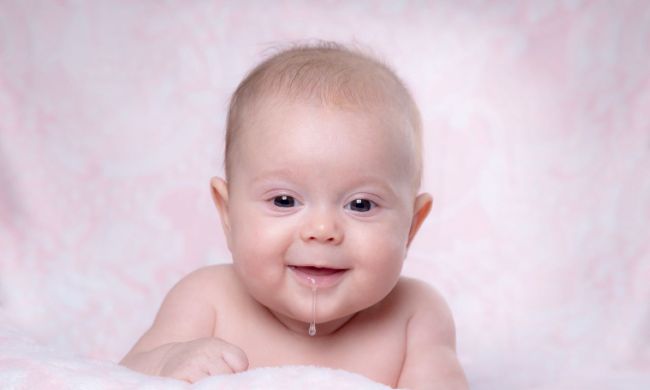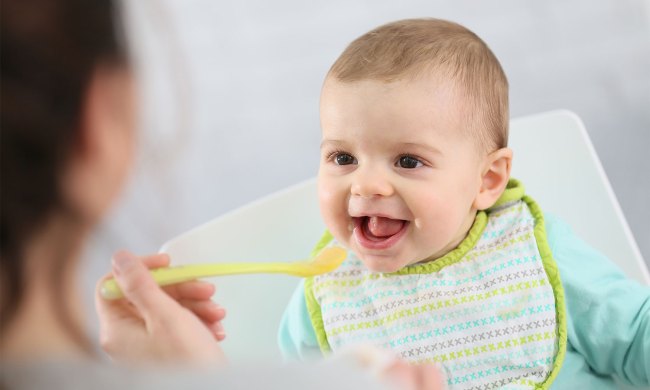As babies approach the sixth-month mark, you are almost to their first half-birthday. This is an exciting and a fun time in your infant’s development. That sixth-month checkup is right around the corner, so you may be wondering about what milestones your baby is reaching.
Milestones are those wonderful accomplishments your baby makes, like smiling for the first time and clapping their hands. Baby milestones are important markers for your little one’s development. This is why your pediatrician will ask you about them during well visits. So, what exactly are the 6-month milestones parents should expect to see from their baby around their half-birthday?
6-month milestones

Baby milestones are how parents and pediatricians keep track of a child’s physical, social, cognitive, and language development. Doing so allows any developmental delays to be identified early. Early detection is vital when addressing any developmental delay.
The important thing to remember about baby milestones is that they are a guideline. There’s a wide range that’s considered normal when it comes to achieving baby milestones. With that being said, what milestones should parents be looking for at the six-month mark?
Happy half-birthday
Your baby has undoubtedly changed a great deal during the last six months. They are much more aware of their surroundings and extremely curious. Now is around the time when you need to be very careful about what’s within their reach because those little hands are ready to grab. Here are some of the 6-month milestones you may start seeing in terms of physical, cognitive, and language development.
Physical
Around the six-month mark you should start to notice more head control from your baby. Improved head control leads to sitting up. This is a fun 6-month baby milestone. Babies may need help sitting up at first, but it won’t take long before they’re able to sit up on their own on a playmat on the floor or in a playpen. Being able to sit up and look around also means baby is ready to sit in a highchair and a stroller.
You should also notice your baby’s hand coordination developing. Around the six-month mark, babies start to reach for toys and other things while beginning to move them from hand to hand. Most babies aren’t ready to stand at six months, but they do like to bounce. Babies may bounce slightly when being held up by you on the floor or on your knees while you’re sitting.
This is also around the time babies begin rolling over. Most babies begin rolling over from their stomachs to their backs. It takes a bit, but this is the first form of mobility you’ll need to be ready for. Not many babies are crawling at this age, but you may notice your little one trying to use arms and legs while lying on a mat.
Tummy time is essential for developing many of the 6-month physical milestones. Setting aside 5 or 10 minutes several times a day to get down on the floor with your baby is a major component for developing gross motor skills. Tummy time should always be supervised, and have fun with it. It’s a wonderful way to enjoy this new active and aware stage your baby is entering.
Cognitive
Now that your baby is much more aware of their surroundings, you should start to notice them recognizing faces. Babies will start to identify grandparents, siblings, and even pets with smiles and outstretched hands. At around the sixth-month mark, babies also begin noticing emotions. They can sense when you’re happy and even sad. Their growing curiosity is another 6-month milestone. This also means it’s time to babyproof the house if you haven’t already. Curious minds are reaching and trying to get to things they shouldn’t be playing with.
Language
A notable 6-month milestone is babbling. Babbling is absolutely adorable, but it’s also an important step in language development. That cute babbling is the beginning of your baby’s speech development. So, encourage the babbling and keep talking to your baby. Babies learn to talk from listening to you. So, keep talking, reading, and singing to your baby. They really are taking it all in.
More 6-month milestones

Babies grow and change so much during those first six months. Here are some more baby milestones you can expect to see.
Sleep
Another milestone that appears around this time that parents really love is sleeping through the night. Sleep is essential for babies, but you should start to see little ones sleeping for a longer stretch at night, like around 8 to 10 hours.
During the day, two naps are still a good idea, even though babies may have something else in mind at six months. Just be careful not to let your baby nap too late in the afternoon. Late naps can interfere with falling asleep at night. When babies sleep through the night, you get to as well.
Food
Most babies begin eating solid foods around the six-month mark. Once babies can sit up confidently in a highchair, most pediatricians give the green light to begin trying solid foods. Your pediatrician will tell you what solid foods to start with. Most often, it’s baby cereal followed by pureed veggies like sweet potatoes. Remember to only introduce one new food at a time. Generally, you wait a minimum of three to five days before trying a new one. This is key to identifying any possible food allergies.
Don’t worry if your baby doesn’t love solids right away. Some do and others aren’t ready. Once your baby starts eating solids, another change on the horizon is their poop. The color, smell, and texture changes, which is normal. Keep your eye out though for loose or watery poops. If that happens after trying a new food, let your doctor know.
A half-birthday is certainly something to celebrate. Just hold off on the cake. Your baby is only starting solids and not ready to dive into the sweet stuff yet. Baby milestones are important components of your baby’s physical, cognitive, and language development. There are quite a few 6-month milestones you should start seeing with your baby. Remember, though, baby milestones are a guide. There isn’t a set timeline for baby milestones. So, don’t compare your baby to anyone else’s, even siblings. Babies develop at their own rate. Doctors track baby milestones in order to identify any potential developmental delays because early intervention is key. If you ever have any concerns about any baby milestones, talk to your doctor.




